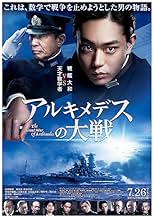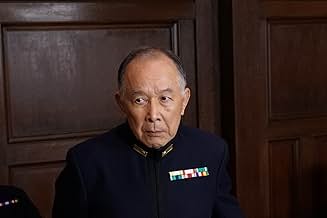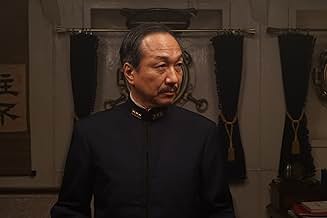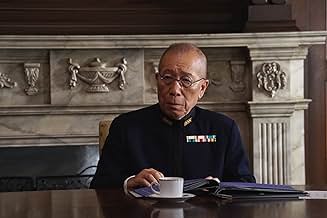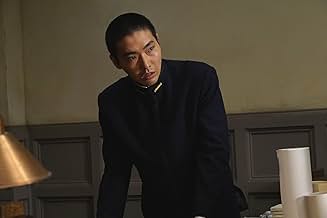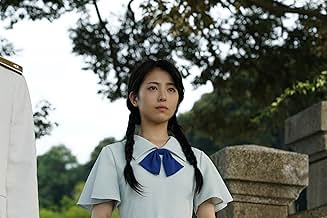IMDb-BEWERTUNG
6,7/10
1321
IHRE BEWERTUNG
1933 deckt ein junger Marineoffizier und Mathe-Wunderkind eine Verschwörung um den Bau japanischer Kriegsschiffe für den laufenden 2. Weltkrieg auf.1933 deckt ein junger Marineoffizier und Mathe-Wunderkind eine Verschwörung um den Bau japanischer Kriegsschiffe für den laufenden 2. Weltkrieg auf.1933 deckt ein junger Marineoffizier und Mathe-Wunderkind eine Verschwörung um den Bau japanischer Kriegsschiffe für den laufenden 2. Weltkrieg auf.
- Regie
- Drehbuch
- Hauptbesetzung
- Auszeichnungen
- 4 Nominierungen insgesamt
T.J. Anthony
- Osami Nagano
- (English version)
- (Synchronisation)
Luis Bermudez
- Mr. Osato
- (English version)
- (Synchronisation)
Jacob Eiseman
- Various Soldiers and Walla
- (English version)
- (Synchronisation)
Alex Hom
- Shojiro Tanaka
- (English version)
- (Synchronisation)
Chase Kloza
- Additional voices
- (English version)
- (Synchronisation)
Lizzy Laurenti
- Walla
- (Synchronisation)
Nicholas Markgraf
- Additional Voices
- (English version)
- (Synchronisation)
- …
Empfohlene Bewertungen
If you are interested in watching this film, I strongly suggest you give a quick read on the general failures of Washington Naval Conference, which sets up the meaning and context of the plot of this film.
Essentially the Washington Naval conference plus London naval conference, like most arms control treaties, addressed and limited the instruments of the PRIOR war in an attempt to forestall future wars. In the case of the 1920's WNC, it effectively limited the number of battleships and other large naval gunfire platforms such as battle/heavy a nation could have. The logic was that since these were main instrumentalities in WWI, and the metric of a nations overall industrial power, that limiting them would prevent war. Hence the "Archimedes" in the title. As you will recall from physics class, the ancient Greek scientist is the one who shouted "eureka" when understanding that as he went into a tub of bathwater that his body was displacing an equal weight of water. This goes to the metric controlled by WNC /LNC-- the weight displaced by warships.
There are two things in the background in this film: a) the systematic cheating on the metrics by Japan, and b) supposed divisions within the Imperial Japanese Navy as to how to allocate its allowed tonnage of displacement. There is a problem in the latter, because this film repeats debunked revisionist claims that the resistance to build battleships like Yamato was significant. It was not. Theses supposedly prescient cadre of young officers who wanted to build more carriers than Japan had built simply did not exist. And the problem Japan had with aviation in WWII was not carriers or airbases -- it was a total inability to replace their aviators due to something that had nothing to do with military industrial capacity . To wit Japan's severely lacking higher education system which is needed from which to select potential air crews. Japan was not able to crew even its land based aircraft being produced even during the war.
Essentially the Washington Naval conference plus London naval conference, like most arms control treaties, addressed and limited the instruments of the PRIOR war in an attempt to forestall future wars. In the case of the 1920's WNC, it effectively limited the number of battleships and other large naval gunfire platforms such as battle/heavy a nation could have. The logic was that since these were main instrumentalities in WWI, and the metric of a nations overall industrial power, that limiting them would prevent war. Hence the "Archimedes" in the title. As you will recall from physics class, the ancient Greek scientist is the one who shouted "eureka" when understanding that as he went into a tub of bathwater that his body was displacing an equal weight of water. This goes to the metric controlled by WNC /LNC-- the weight displaced by warships.
There are two things in the background in this film: a) the systematic cheating on the metrics by Japan, and b) supposed divisions within the Imperial Japanese Navy as to how to allocate its allowed tonnage of displacement. There is a problem in the latter, because this film repeats debunked revisionist claims that the resistance to build battleships like Yamato was significant. It was not. Theses supposedly prescient cadre of young officers who wanted to build more carriers than Japan had built simply did not exist. And the problem Japan had with aviation in WWII was not carriers or airbases -- it was a total inability to replace their aviators due to something that had nothing to do with military industrial capacity . To wit Japan's severely lacking higher education system which is needed from which to select potential air crews. Japan was not able to crew even its land based aircraft being produced even during the war.
Great Japanese film about the pre-war corruption, code of honor and nationalistic pride that led to Japan's complete destruction. So many in the high command knew a war with America was unwinnable but militaristic pride and honor to the Emperor ruled their decisions.
Largest Battleship ever built used for nothing more than a Kamikaze Raid that took 3000 sailors.
Not an action film (apart from the sinking), but a Japanese snapshot of ne part of mindset that led to war.
Best watched in the original Japanese with subtitles.
*oh, actor who portrayed Admiral Nagumo in Midway plays Admiral Nagano here.*
Largest Battleship ever built used for nothing more than a Kamikaze Raid that took 3000 sailors.
Not an action film (apart from the sinking), but a Japanese snapshot of ne part of mindset that led to war.
Best watched in the original Japanese with subtitles.
*oh, actor who portrayed Admiral Nagumo in Midway plays Admiral Nagano here.*
This is a fictionalized story is based on a manga and is not meant to be historically accurate. The first exciting 15 minutes of the movie made me think it was a war film. Instead it is a tale of a mathematician, who 9 years before the battle, tried heroically to prevent a money wasting battleship from being built for Japan's pre-WW2 navy instead of a carrier built on behalf of the forward thinking General Yamamoto.
The attack on the battleship at the beginning was well done and exciting. The main character ,played by Masaki Suda, gives an award-winning quality performance. The rest of the cast is good as well. Watching it in the original Japanese will better reflect their performances. There are some not so believable elements that you'll need to put aside in order to better enjoy the film. The final act has a poignant and surprising twist.
The attack on the battleship at the beginning was well done and exciting. The main character ,played by Masaki Suda, gives an award-winning quality performance. The rest of the cast is good as well. Watching it in the original Japanese will better reflect their performances. There are some not so believable elements that you'll need to put aside in order to better enjoy the film. The final act has a poignant and surprising twist.
"The Great War of Archimedes" (2019) offers a captivating journey into naval politics and wartime calculations. Though visually impressive, the film's 2+ hour runtime can feel bloated at times, with repetitive sequences and drawn-out dialogues. While the central plot about a math prodigy uncovering corruption is intriguing, the pacing hinders its full impact.
Despite these shortcomings, the film's strength lies in its engaging characters and the compelling moral dilemma presented. Suda Masaki delivers a nuanced performance as the conflicted math whiz, while the supporting cast adds depth and intrigue. The film successfully portrays the complexities of war and the sacrifices demanded from individuals caught in its midst.
Overall, "The Great War of Archimedes" is a worthwhile watch for those interested in historical dramas and intricate plotlines. However, viewers seeking a fast-paced experience might find it a bit long-winded.
Rating: 7/10.
Despite these shortcomings, the film's strength lies in its engaging characters and the compelling moral dilemma presented. Suda Masaki delivers a nuanced performance as the conflicted math whiz, while the supporting cast adds depth and intrigue. The film successfully portrays the complexities of war and the sacrifices demanded from individuals caught in its midst.
Overall, "The Great War of Archimedes" is a worthwhile watch for those interested in historical dramas and intricate plotlines. However, viewers seeking a fast-paced experience might find it a bit long-winded.
Rating: 7/10.
I watched the Japanese language version of this movie last night and was impressed with the Japanese cast and their performances. I was unaware that an English dub existed until doing a little research today.
After watching the English dub, I was impressed by all of the English dub actors except for one. The most important one. I'm referring to the lead role of Tadashi Kai originally (well) played by Masaki Suda. Suda's performance was both impressive and expressed the realism that should be expected of a lead actor.
However: The English voice actor chosen to portray the character of Tadashi Kai did a huge disservice to the entire tone of the role. While I will give "Derick Snow" exceptionally high marks for his many performances as a dub actor in the wonderful world of Japanese Anime, his portrayal of "Lt. Commander Tadashi Kai was both childish and demeaning. Snow made the lead actor in this movie sound like a pansy. It was actually quite embarrassing. One can only hope that Masaki Suda never hears how he was portrayed by an American actor.
You may say that this is one man's opinion, and you would be correct. However I have made my living using my own voice in the broadcast media industry for more years that I care to count these days. Hate me if you will, but I stand by my words.
Just another voice in the crowd :)
After watching the English dub, I was impressed by all of the English dub actors except for one. The most important one. I'm referring to the lead role of Tadashi Kai originally (well) played by Masaki Suda. Suda's performance was both impressive and expressed the realism that should be expected of a lead actor.
However: The English voice actor chosen to portray the character of Tadashi Kai did a huge disservice to the entire tone of the role. While I will give "Derick Snow" exceptionally high marks for his many performances as a dub actor in the wonderful world of Japanese Anime, his portrayal of "Lt. Commander Tadashi Kai was both childish and demeaning. Snow made the lead actor in this movie sound like a pansy. It was actually quite embarrassing. One can only hope that Masaki Suda never hears how he was portrayed by an American actor.
You may say that this is one man's opinion, and you would be correct. However I have made my living using my own voice in the broadcast media industry for more years that I care to count these days. Hate me if you will, but I stand by my words.
Just another voice in the crowd :)
Wusstest du schon
- WissenswertesAt about 5:30, the ammunition magazines on the battleship Yamato explode, after which the capsized (inverted) bow of the Yamato rises up from the water into a vertical position before sinking. This mirrors the manner in which the future Space Battleship Yamato is destroyed in Uchû senkan Yamato: Kanketsuhen (1983), which itself was later recreated in the reboot series The Trap on All Sides (2012) (albeit her "destruction" in this case only being a ruse to deceive the enemy).
Top-Auswahl
Melde dich zum Bewerten an und greife auf die Watchlist für personalisierte Empfehlungen zu.
- How long is The Great War of Archimedes?Powered by Alexa
Details
- Erscheinungsdatum
- Herkunftsland
- Offizielle Standorte
- Sprache
- Auch bekannt als
- The Great War of Archimedes
- Produktionsfirmen
- Weitere beteiligte Unternehmen bei IMDbPro anzeigen
Box Office
- Weltweiter Bruttoertrag
- 16.454.674 $
- Laufzeit
- 2 Std. 10 Min.(130 min)
- Farbe
Zu dieser Seite beitragen
Bearbeitung vorschlagen oder fehlenden Inhalt hinzufügen

![Trailer [OV] ansehen](https://m.media-amazon.com/images/M/MV5BZmVlZWNmMmMtYmUxMy00MGQ5LWIyMTMtYTRlY2E1M2M0OWNkXkEyXkFqcGdeQXRyYW5zY29kZS13b3JrZmxvdw@@._V1_QL75_UX500_CR0)
